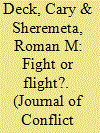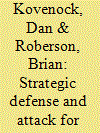| Srl | Item |
| 1 |
ID:
115730


|
|
|
|
|
| Publication |
2012.
|
| Summary/Abstract |
This article examines theory and behavior in a two-player game of siege, sequential attack and defense. The attacker's objective is to successfully win at least one battle, while the defender's objective is to win every battle. Theoretically, the defender either folds immediately or, if his valuation is sufficiently high and the number of battles is sufficiently small, then he has a constant incentive to fight in each battle. Attackers respond to defense with diminishing assaults over time. Consistent with theoretical predictions, the authors' experimental results indicate that the probability of successful defense increases in the defenders valuation and it decreases in the overall number of battles in the contest. However, the defender engages in the contest significantly more often than predicted and the aggregate expenditures by both parties exceed predicted levels. Moreover, both defenders and attackers actually increase the intensity of the fight as they approach the end of the contest.
|
|
|
|
|
|
|
|
|
|
|
|
|
|
|
|
| 2 |
ID:
116235


|
|
|
|
|
| Publication |
2012.
|
| Summary/Abstract |
The contest-theoretic literature on the attack and defense of networks of targets focuses primarily on pure-strategy Nash equilibria. Hausken's 2008 European Journal of Operational Research article typifies this approach, and many of the models in this literature either build upon this model or utilize similar techniques. We show that Hausken's characterization of Nash equilibrium is invalid for much of the parameter space examined and provides necessary conditions for his solution to hold. The complete characterization of mixed-strategy equilibria remains an open problem, although there exist solutions in the literature for special prominent cases.
|
|
|
|
|
|
|
|
|
|
|
|
|
|
|
|